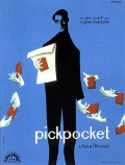
Directed by
Robert Bresson
75 minutes
Rated M
Reviewed by
Bernard Hemingway

Pickpocket
I’ve never been a fan of Robert Bresson’s films despite the fact that he seems to be universally-regarded as an auteur amongst cinéastes. With Pickpocket I have no idea what he is doing.
Taking the bones of the 'Crime and Punishment' Fyodor Dostoevsky 1866 novel which tells the story of Rodion Raskolnikov, an impoverished former student in Saint Petersburg who robs and kills two miserly old people in order liberate himself from poverty. He justifies his act with the general principle that crimes are justifiable if they enable the higher goals of 'extraordinary' men. Once the deed is done, however, he becomes wracked by guilt and his confidence crumbles.
Bresson transposes the story to contemporary Paris and makes his protagonist Martin (Martin Lassalle) a weasely individual who cannot be bothered to get a job and even turns out to be a not very competent pickpocket yet who invokes the same justification for his crimes. Clearly he is not ‘extraordinary’ but also neither are his crimes. Whilst murder has a certain proportionality to Raskolnikov’s Nietzschean ideas of the “superior man” Martin is not only content to lift wallets and watches from completely undeserving strangers but also to steal from his dying mother.
Given Bresson’s well-known antipathy to performance from his actors (Lassalle was a non-professional) why, short of sado-masochism (not an altogether impossible idea as Bresson films Martin‘s crime with sexual implications, notably the scene in which Martin inserts his hand into an elegant woman’s handbag), would he choose to film a highly emotive story of redemption and moral generation. Is it to challenge our petty bourgeois attachment to private property? Or, given his treatment of his mother, our belief in natural justice?
There is no doubt that Bresson was a master auteur. Léonce-Henri Burel’s black and white cinematography is marvellous and Bresson’s use of Lully’s music sustains the restrained tone of his film bu I'm afraid I find it all a bit too creepy.
Want something different?





